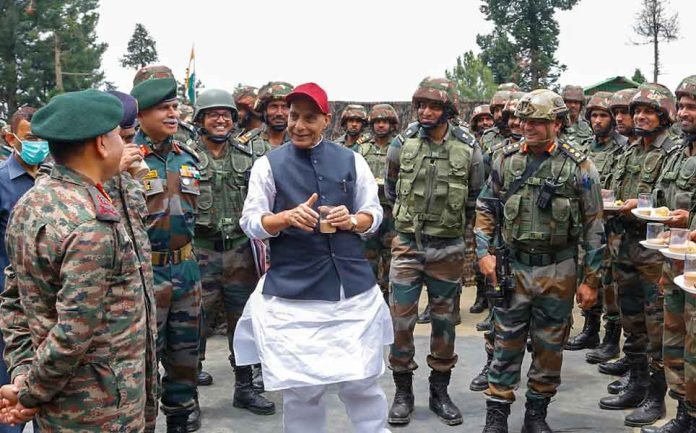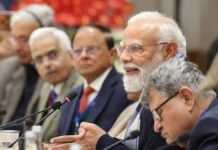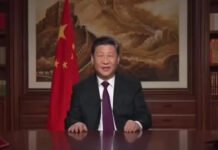INVC News
Jammu : During a ‘National Security Conclave’ in Jammu on June 26, 2023, the Defense Minister of India, Rajnath Singh, emphasized that national security is the government’s highest priority, with a commitment to protecting the sovereignty, unity, and integrity of the country. He highlighted a significant shift in India’s security scenario over the past nine years, noting that India was once perceived as a weak nation allowing adversaries to create problems. However, he asserted that India has now developed the ability to overcome any threat.
Rajnath Singh outlined the government’s blueprint on national security, which focuses on four directive principles. These principles include enabling the country to address security threats, taking actions to protect national interests, creating safe conditions for progress and improving people’s lives, and fostering an environment of cooperation with friendly nations to address global challenges like terrorism.
The Defense Minister assured the nation that no efforts are being spared in equipping the military with the latest weaponry and modern technology. He expressed confidence in the capabilities of the Armed Forces to protect the borders and the seas, with the goal of bringing them to the forefront of modern militaries.
Regarding cross-border terrorism, Rajnath Singh highlighted Pakistan’s attempts to destabilize peace and harmony in India. He credited the government for launching effective actions against terrorism, demonstrating “zero tolerance” in the aftermath of incidents like Uri and Pulwama. He also mentioned that India has successfully garnered global support against terrorism, exemplified by the joint statement issued after Prime Minister Narendra Modi’s meeting with US President Joe Biden.
The Defense Minister stated that the network of terrorism in Jammu and Kashmir has substantially weakened over the years due to strict and consistent actions. Measures have been taken to curb terror funding, stop the supply of arms and drugs to terrorists, and dismantle the network of underground workers.
Regarding the abrogation of Article 370 in Jammu and Kashmir, Rajnath Singh highlighted that this decision has connected the people of the region with the country’s mainstream, fostering a new era of peace and progress.
On the issue of Pakistan-occupied Kashmir (PoK), the Defense Minister stated that Pakistan has no legitimacy over the region as it has illegally occupied it. He mentioned that the Indian Parliament has unanimously passed resolutions affirming that PoK is a part of India.
Addressing the border situation with China, Rajnath Singh described it as a matter of perceptional difference. He acknowledged the existence of agreements and protocols guiding the patrolling activities of both countries’ armies. Referring to the standoff in East Ladakh in 2020, he criticized the Chinese Army for disregarding agreed protocols and unilaterally attempting to change the status quo on the Line of Actual Control (LAC). He praised the valor and dedication of the Indian Army for preventing such attempts.
The Defense Minister reiterated the government’s commitment to resolving the border issue with China through dialogue and peaceful means. He assured the nation that talks are ongoing at military and diplomatic levels to resolve the dispute, emphasizing that India will never compromise on its borders, honor, and self-respect.
Rajnath Singh highlighted various measures undertaken by the government to strengthen national security, including bolstering border infrastructure and achieving self-reliance in defense. He mentioned positive indigenization lists and the allocation of 75% of the defense capital procurement budget for the domestic industry in the financial year 2023-24. The aim is to reduce dependence on imported weapons and promote “Make in India” in defense manufacturing. He noted significant progress in defense exports, which have exceeded Rs 16,000 crore compared to Rs 900 crore before 2014, with expectations of reaching Rs 20,000 crore soon.
The Defense Minister also mentioned structural reforms, such as the appointment of the Chief of Defence Staff and the establishment of the Department of Military Affairs. He revealed ongoing efforts to establish theater commands, which would be a revolutionary reform in the Indian defense structure.
Rajnath Singh emphasized the transformed image of India on the global stage under the dynamic leadership of Prime Minister Narendra Modi. He highlighted the Prime Minister’s credibility and stated that the world now keenly listens to India on international forums.
The Defense Minister stressed the importance of coordination with major world powers like the United States and Russia to protect India’s security interests in a globalized world. He noted the growth of India-US defense cooperation, particularly in military engagements, information sharing, and cooperation in areas such as Artificial Intelligence, cyber, space, and logistics support. He regarded the Prime Minister’s recent visit to the US as a landmark event that has ushered bilateral defense cooperation into a new era.
Rajnath Singh called for an integrated and united response to global threats and challenges, stating that India, as a major regional power, should align its security concerns with other countries in the extended neighborhood.
The Defense Minister highlighted the General Electric (GE) Aerospace-Hindustan Aeronautics Limited deal to co-produce F-414 fighter jet engines in India. This deal positions India as the fourth country capable of manufacturing jet engines, which will be fitted in Tejas aircraft.
Regarding the acquisition of MQ-9B drones from the US, Rajnath Singh rejected speculative reports on the price and other terms, emphasizing that the Ministry of Defence will compare the acquisition cost with the best prices offered to other countries by General Atomics (GA). He assured that the acquisition process will follow established procurement procedures.
















